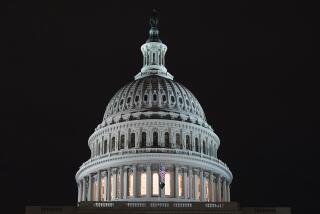Healthcare reform gets boost from hospital groups
- Share via
WASHINGTON — In the face of mounting Republican opposition to its healthcare agenda, the Obama administration received a boost Wednesday, winning a preliminary agreement with leading hospital groups to cut federal payments to the industry over the next decade.
Under the plan, negotiated primarily by Senate Finance Committee Chairman Max Baucus (D-Mont.), hospitals would accept $155 billion in cuts if the administration and its congressional allies succeeded in extending health insurance to tens of millions of people who are now without coverage.
None of the hospital groups has signed a written agreement backing the cuts, nor is there any guarantee that the cuts will be included in versions of the healthcare legislation being developed by lawmakers other than Baucus.
“We have agreements on specific points, and the understanding is that if those points materialize, that’s great,” said Rich Umbdenstock, who heads the American Hospital Assn. “If they don’t, we’re back in discussions.”
In one potentially ominous sign Wednesday, House Energy and Commerce Committee Chairman Henry A. Waxman (D-Beverly Hills) said House leaders would not be bound by an agreement with the pharmaceutical industry that was announced by the White House last month.
But the pledges from hospital leaders may help galvanize support for the healthcare overhaul at a key moment.
Senior Democrats are struggling to draft legislation that would not drive up the national debt but still accomplish the main goals of expanding health coverage, controlling costs and improving the quality of care.
Vice President Joe Biden deemed the hospital accord a sign of progress and called for enactment of healthcare legislation by the end of August.
“We have these hospitals working with us, and we have the pharmaceutical industry working with us. We have doctors and nurses and healthcare providers with us. We have the American public behind us,” said Biden, who was standing in for President Obama, who is overseas. “Things remain on track. . . . And, in my view, we’re going to get that change, and we’re going to get it this year.”
Baucus and the White House have been working intensely for months to enlist industry support for the overhaul, in part to help offset the cost of the expanded coverage, which many expect to top $1 trillion over the next 10 years.
In June, the Pharmaceutical Research and Manufacturers of America announced that its members would provide $80 billion worth of discounts on medications for seniors and others who rely on government health insurance programs such as Medicare.
Much of the savings in the hospital deal would come through across-the-board cuts in the rates the federal government pays hospitals for patients on Medicare, according to officials familiar with the agreement.
But at least $50 billion in cuts would be linked directly to increases in the number of currently uninsured Americans who gained coverage. The federal government now pays billions of dollars to hospitals that care for large populations of uninsured.
Additional savings would come from new incentives for hospitals to prevent patients from having to be readmitted after treatment, which experts believe could save the Medicare and Medicaid programs about $2 billion over the next decade.
--
More to Read
Sign up for Essential California
The most important California stories and recommendations in your inbox every morning.
You may occasionally receive promotional content from the Los Angeles Times.











